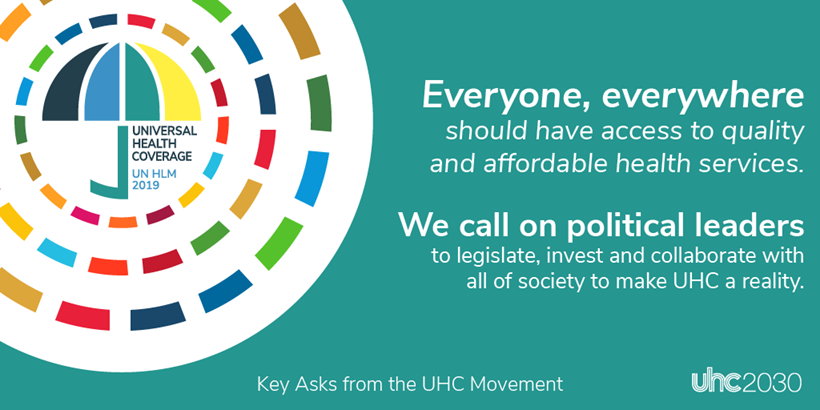This blog is part of a series on Universal Health Coverage (UHC). The series includes contributions from external bloggers and reflects their view. Follow the conversation on Twitter #HealthForAll.
In April 2019, a multi-stakeholder hearing took place in New York to promote an ambitious agenda for universal health coverage (UHC). This meeting was organised by the President of the General Assembly as part of the preparation for the UN High-Level meeting on UHC to get views from non-state actors. We heard many stories from colleagues and partners that stayed in our memories. A story of a child dying following a road traffic accident because the nearest health facility did not have supplies of life-saving blood. Another story of an elderly parent dying in hospital because there was not enough money to pay for treatment.
There are many stories like this all over the world; stories of ill health, lost lives and devastated families because, quite simply, the health system is not strong enough to provide the services that people need at affordable prices.
This is why the global movement for UHC is pushing really hard to get genuine commitment, action and investment from governments and health stakeholders everywhere to deliver UHC. UHC2030 is a multi-stakeholder platform and was created to strengthen the global movement for UHC through coordinated action and advocacy. We are stakeholders from governments, communities and civil society, the private sector, development partners and academia, and are collectively pushing for all countries to implement UHC as fast as possible.
Soon, on 23 September 2019, the UN High-Level Meeting on UHC will take place during the United Nations General Assembly, with the theme of ‘UHC: Moving Together to Build a Healthier World.’ It is the last chance before 2023, the mid-point of the SDGs, to mobilise the highest political support for UHC as the cornerstone to achieving SDG3 and uniting other health agendas under a common theme.
The UN HLM must be truly transformative, as our civil society constituency strongly argues. UHC2030 has developed a set of six Key Asks from the UHC Movement through a broad consultative process. It proposes an agenda for the UN HLM political declaration with milestones for achieving UHC by 2030.
Across these Key Asks and Action Agenda from the UHC Movement, we urge political leaders to re-commit to gender equality, redress gender power dynamics and ensure women’s and girls’ rights as foundational principles for UHC.
- ASK 1: Ensure political leadership beyond health – Commit to achieve UHC for healthy lives and wellbeing for all at all stages, as a social contract.
- ASK 2: Leave no one behind – Pursue equity in access to quality health services with financial protection.
- ASK 3: Regulate and legislate – Create a strong, enabling regulatory and legal environment responsive to people’s needs
- ASK 4: Uphold quality of care – Build quality health systems that people and communities trust.
- ASK 5: Invest more, invest better – Sustain public financing and harmonize health investments.
- ASK 6: Move together – Establish multi-stakeholder mechanisms for engaging the whole of society for a healthier world.
For this blog series, Key Ask 5 is of particular interest: Invest more, invest better. We strongly argue that current funding levels are insufficient to achieve UHC by 2030.
Governments need to increase domestic investment and allocate more public financing for health through equitable and mandatory sources. Governments must improve efficiency and equity in the use of existing resources and reduce reliance on impoverishing out-of-pocket payments. Development assistance to health should reduce fragmentation and strengthen national health financing capacities.
In order for governments to adopt ambitious investment goals for UHC, make progress in mobilising domestic pooled funding and reduce catastrophic health expenditure (SDG 3.8.2), the following action is needed:
- Set nationally appropriate spending targets for investments in health (e.g., ideally at least 5% of GDP on public health spending) consistent with sustainable national development strategies and ensure efficient and equitable allocation of resources to primary health care. Mobilisation of domestic resources requires cooperation between ministries of health and finance.
- Increase public financing for health and pool health financing through mandatory contributions so that everyone can access the health services they need without financial hardship due to out-of-pocket payments. This requires mechanisms such as progressive taxation, public subsidies to marginalised populations and mechanisms to include the large and growing informal sector through more flexible use of general revenues.
- Foster strong alignment among global health actors and development partners to support progress, including coordination of financing mechanisms. Countries need to adapt to transition from external funding that aim to increase effective coverage of priority interventions toward achieving and sustaining UHC
- Invest in global and regional public goods including universal access to essential medicines, vaccines, technology and emergency preparedness.
- Explore how digital, technological, financial and social innovations can help to address challenges to deliver quality health services.
- Prioritise debt restructuring to address the debt sustainability challenges faced by many countries and decrease competition in the fiscal space between debt servicing and health spending.
We welcome the commitment of member states in the draft political declaration “to adequately increase public spending, as necessary, with a special emphasis on primary health care […]”, and the acknowledgement of WHO’s recommendation of an additional 1% of GDP or more on public spending for primary health care. This is an important immediate step that all countries, rich and poor alike, can make towards more ambitious increases such as the aspirational target of 5% of GDP public spending on health advocated by civil society.
Let’s turn the ambition of the SDGs into action and ensure commitment from countries and all stakeholders to take these real steps to achieve UHC.
@IlonaKickbusch and @daktari1 are Co-Chairs of the @UHC2030 Steering Committee





Join the Conversation